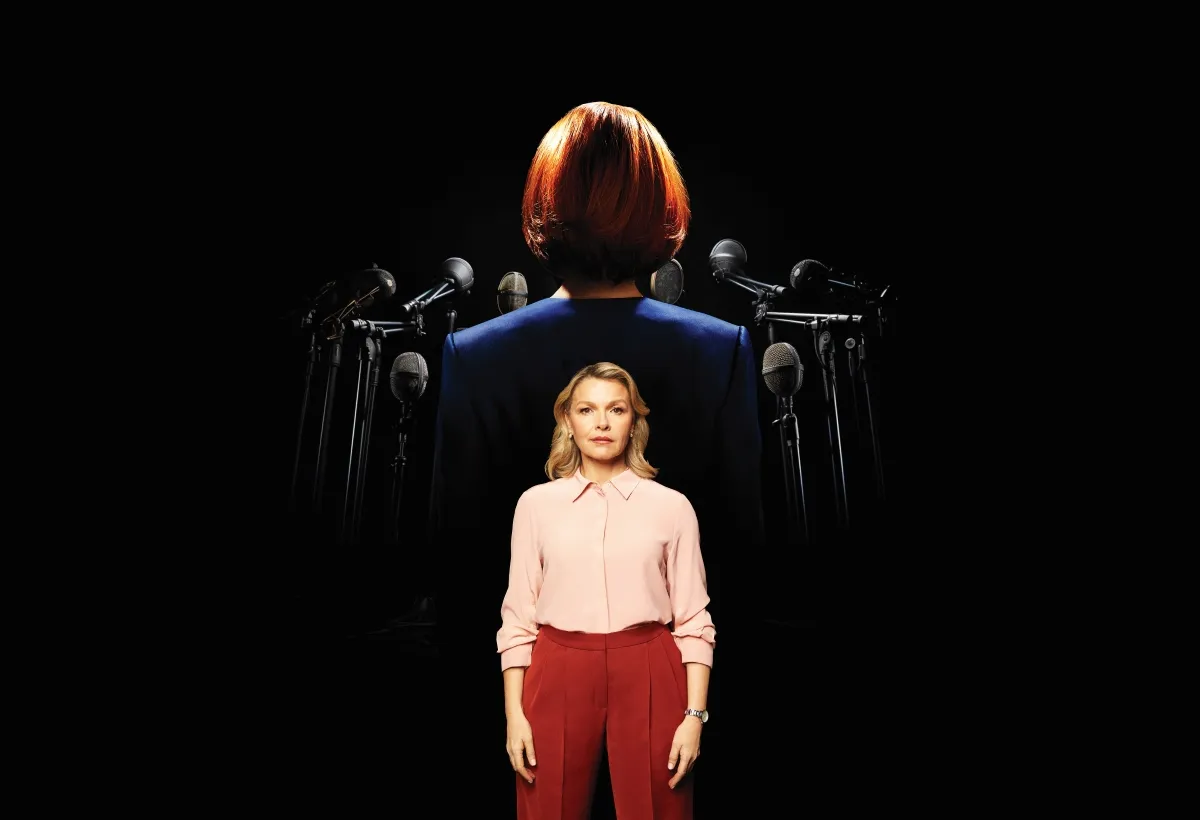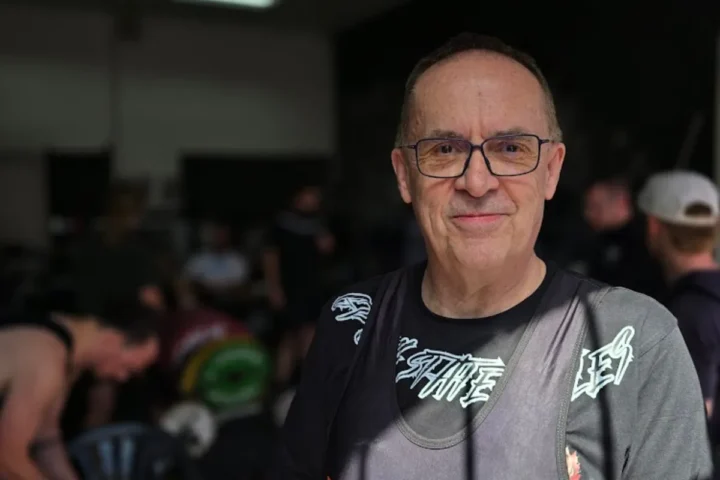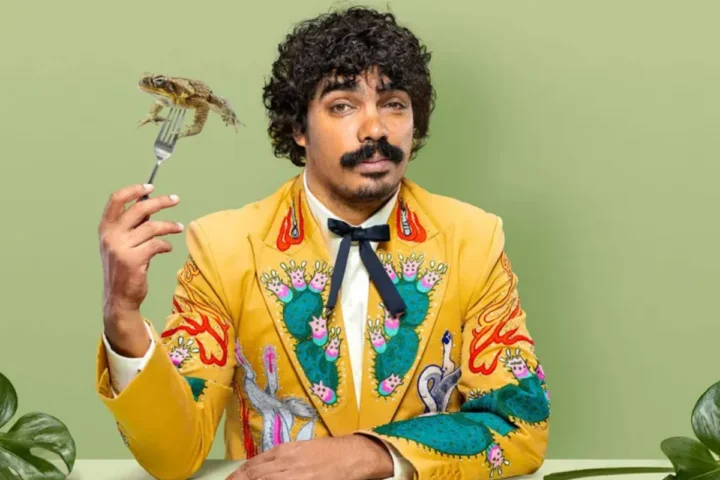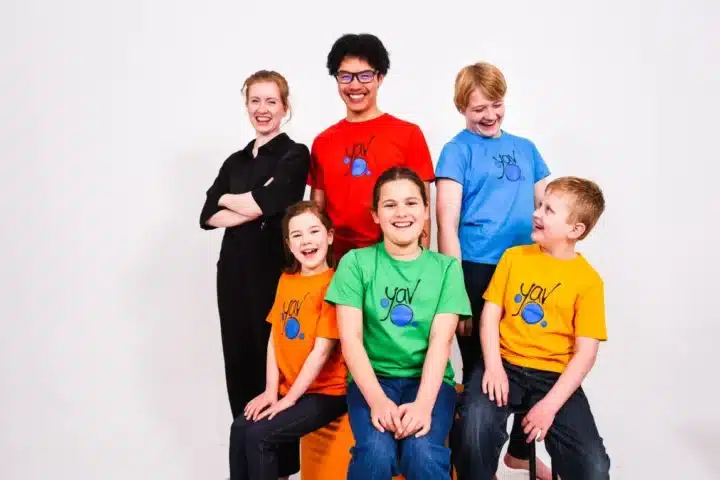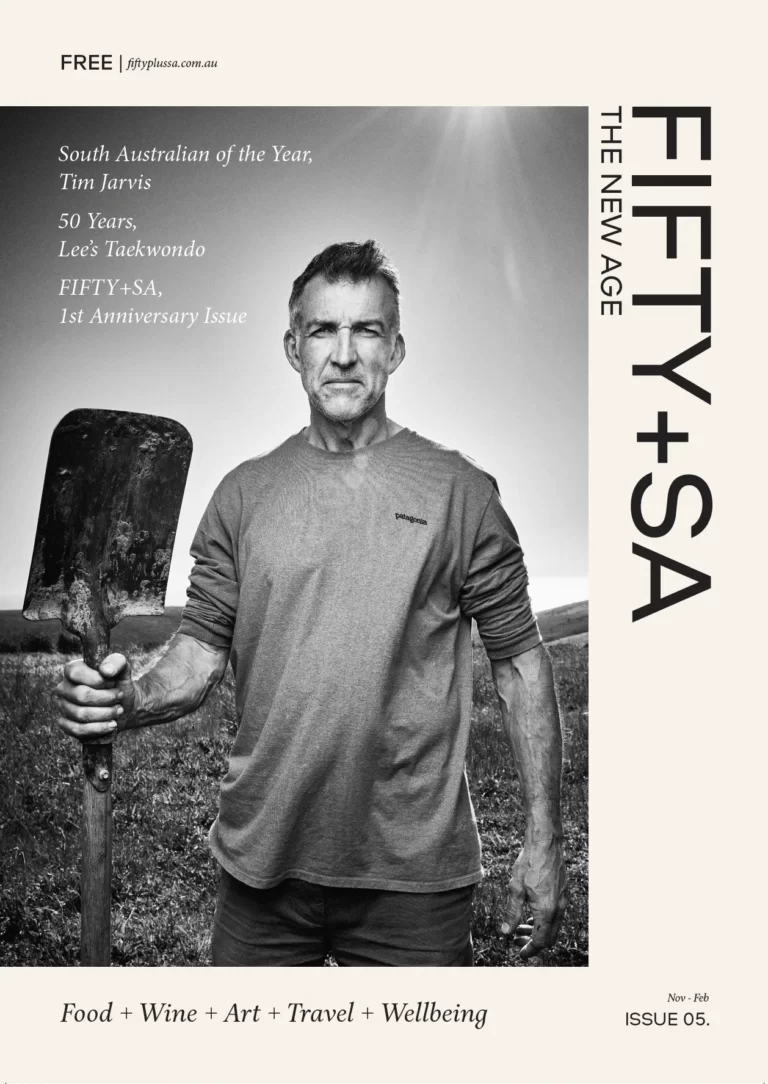INTERVIEW: Lucy Budzynska
WORDS: Olivia Williams
In this interview, Justine Clarke, who plays Gillard in the upcoming State Theatre Company production, shares her journey of embodying such a pivotal figure. Clarke, renowned for her dramatic prowess following her triumphant turn in Girls & Boys, takes on the role of a lifetime, portraying the life and legacy that led to Gillard’s famous ‘misogyny speech’. Portraying a real-life figure like Julia Gillard is no small feat. It requires not just a deep dive into her public persona, but also a nuanced understanding of her private struggles and triumphs.
We speak with Clarke about her preparation, the challenges she faced, and the profound impact of bringing this historic moment to the stage.

How do you approach the task of embodying a real-life figure like Julia Gillard while also infusing your own interpretation into the role?
You do a lot, you do all the research that you can about the person. You watch as much as you can, you take a lot of cues from the text, which has its own life and a certain amount of research you have to do that involves mining the actual text rather than the person.
So there’s those two things to balance, and within the piece itself, it’s very much about…whilst it is about Julia Gillard and Julia Gillard’s life, her legacy and the moments that led up to this history-making moment in Parliament will live on forever in Australian history.
It’s also about all the women that were affected by it at the time and in the generations after it. So the piece is also about the female response to seeing a woman in that leadership role for the first time. So it’s not always embodying her. And I certainly didn’t want to parody her or do an impersonation of her that was in any way mocking. She had enough of that when she was in office. So it was a dance to find the balance that would kind of serve the work, if that makes sense.
What challenges did you encounter in bringing to life the pivotal moment of Julia Gillard’s anti-misogyny speech, and how did you prepare for such a powerful scene?
The speech is a politician at the height of her powers. She’s an incredible orator. She performs incredibly well in question time and in parliament.
For the most part, as we know, it was off the cuff. She had a few points and she had the top 10 most sexist comments from Tony Abbott. But for the most part, it came from a genuine moment of internal frustration and rage, but in that is this extraordinarily well-structured argument and very articulate. It has all the right qualities of a good speech.
It’s got great repetition. It goes right to the heart of the point. It’s got comedy and drama. It’s got everything. And it’s, I think if you watch it, it’s 15 minutes. One of the challenges was just to be able to sustain that 15 minutes. It looks effortless to her, but when you actually do it, it’s not. It requires incredible technique that she would have honed from her time as a debater in high school and public speaker in high school all the way to being in her early fifties. You realise what extraordinary stamina and tenacity are required to stand in front of parliament in question time.
It’s a play about a politician, not necessarily about politics.
It requires a lot of physical energy and for all your powers to be aligned. The challenge was to try and find where to breathe and where to swallow. I watched the speech many, many times and did a lot of work with my voice coach on refining her tone and indeed where she did breathe, her speech sounds, her patterns, and her rhythms.
The whole piece centres around the moment before she speaks, and we wanted it to feel as much like the document that it is, to have an oral or theatrical document of it because so many people identified with it. So many women in workplaces across Australia and indeed across the world identified with it. Everything else in the play is very much about an imagined inner world of a public servant, but the speech is what is undeniable about the whole thing.
It’s not political. It is working on a much deeper level and works on our collective psyche and our history in a deeper way, as big moments in history often do.
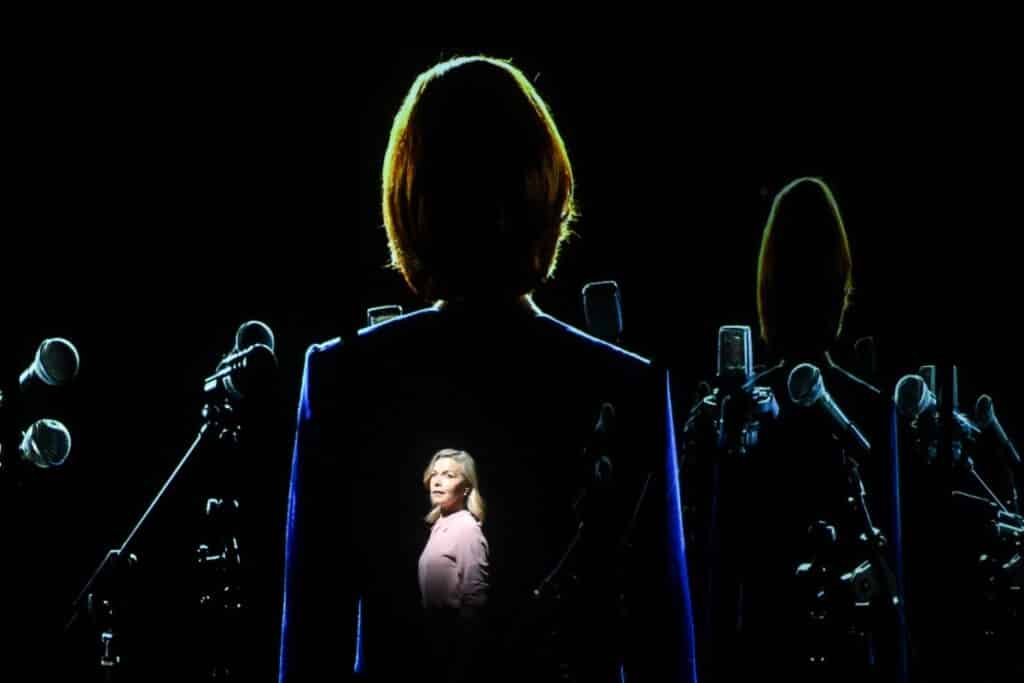
What do you hope audiences will take away from Julia, and what message or impact do you think the play has in the context of contemporary politics and women’s rights?
Well, we’ve already done two seasons. This is our third season. We did a season in Canberra and then in Sydney. We’re halfway through our Melbourne season and then back to Adelaide after another Canberra season. Each time we do it, it’s a different political climate. It’s a play about a politician, not necessarily about politics.
In fact, it’s not about politics, but it is about a politician. So you bring with you the current political climate, and it’s always going to be received slightly differently. But for the most part, it feels like an invigorating night in the theatre, and it leaves people wanting to talk.
I think that’s all you can ask for in the theatre, is to give people the chance to turn to the person next to them who they don’t necessarily know and have a conversation. There’s something about everybody having an opportunity to relive a shared history that we all know was brutal and unfair. But in the end, it was a positive thing.
There’s something about everybody having an opportunity to relive a shared history that we all know was brutal and unfair. But in the end, it was a positive thing.
I hope that people feel like they’ve put it in order and it’s been righted in some way or that maybe it’s just made them think again about their own reaction at the time or how they feel now. Some people find it very moving. It’s wonderful to be in a room with people who can remember and share in something that we all went through. It’s theatre at its most powerful, I think.
Like I say, it’s not necessarily a political play. I think we can all relate and remember how badly treated Julia Gillard was by the press and the opposition and by some of the things we allowed people to say. She would say this too, that she allowed them to say those things and didn’t speak up. She has said, post, that she may have said things earlier, but she thought the right thing to do was not to say anything publicly because it would only make it worse.
Even after the speech, it didn’t stop in Australia. It just continued. It was like we were deaf to it or something. I think things have changed because of that speech. I would argue that things like the Me Too movement may not have happened without that speech. We don’t know for sure, but I feel it was part of a movement that’s been like a rolling wave over the last 12 years or so.
We see now within parliament that there are many more women in parliament, and that’s the only way forward. In terms of women’s rights, I think it’s something we have to keep speaking up about, and that’s what she did so eloquently. Much of it was about fairness in the workplace. That’s where she comes from. It’s not about being a woman. It’s about what’s fair.
She’d had enough. Absolutely. And I think we have to listen to those moments when we’ve had enough and speak up. That’s what she did. She spoke up because other people didn’t. She said she couldn’t speak up, but maybe she was hoping others would, and they didn’t. Some people, not everybody, but as a collective, it had to come from her.
I think we have to listen to those moments when we’ve had enough and speak up. That’s what she did.
Can you share any memorable moments or insights from your time working on Julia that have left a lasting impression on you?
I think it’s the young people that come to see it and how emotionally invested they are in it. That’s been the most gratifying and surprising for me, in a way, that they feel like she’s closer to them than I thought. It’s that young people know this story in some ways better than we do. So it’s been their responses and the responses of older women and people who lived through it. I think the most memorable thing generally would be the audience response. It’s like no other play I’ve done.
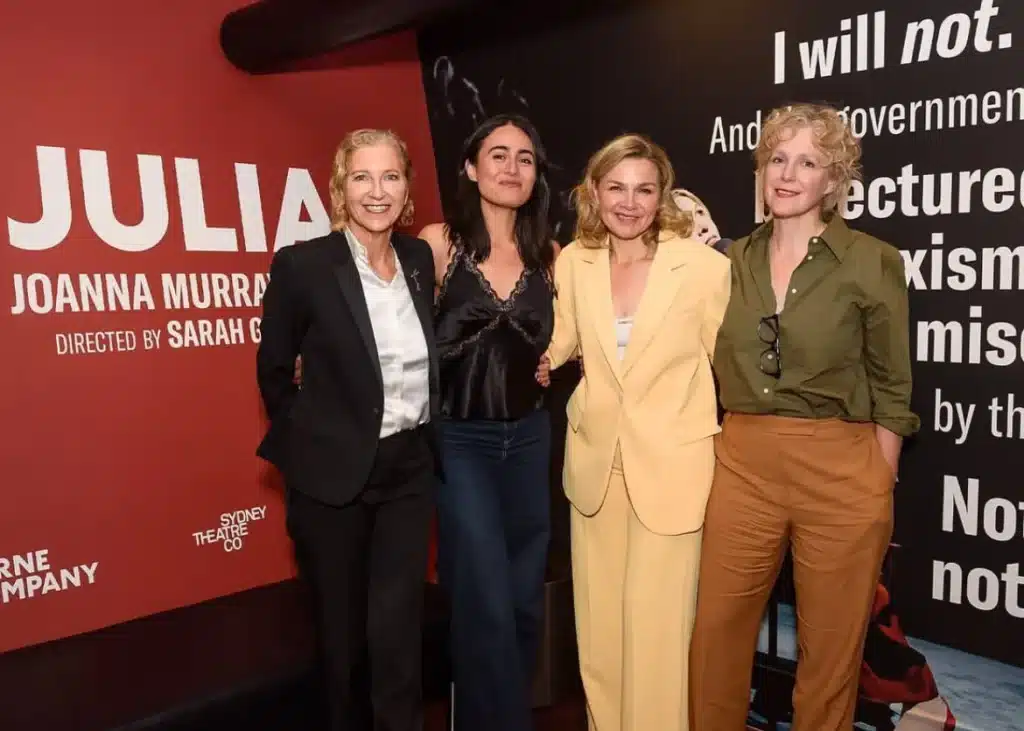
Given your connection to State Theatre Company South Australia and your support for Dramatic Women, how important is it for you to be involved in projects that highlight diverse female voices and experiences?
I think there’s a thirst for it in theatre at the moment. We can see that with the work being produced and that people are going to. Of course, we had those dark years with COVID, but if the piece is right, people come back. There’s definitely a thirst for female stories and female-led stories.
From my own experience, theatre can be the most nourishing experience when you are being told a story that reflects your life or is something you can relate to or identify with. The more we hear these stories from women, the more we realise how starved we’ve been of them.
The more we hear these stories from women, the more we realise how starved we’ve been of them.
I just hope it continues. But I also hope that we get back to a stage where the arts are more supported and theatre companies are supported to make bigger works, with more than just one or two people on stage. That’s come out of necessity after COVID, and people are building their way back up.
Shows like “Counting and Cracking” where there’s lots of people on stage, we need more of those as well. We need diversity across ages and colours, and mainly stories that theatre-goers can relate to. Some shows might be heavier on the technical side and lighter on the actors, but theatre is about actors and human connection. I hope we don’t forget that.
The play highlights Julia Gillard’s resilience and determination in the face of adversity. What aspects of Gillard’s character did you find most inspiring?
Oh, so much.
So much. I mean, basically everything about her. I just think she’s an extraordinary human being. The difference between someone like her and someone like me is that, as an actor, you’re constantly self-reflecting and self-analysing, doing a psychological study on yourself and everyone around you.
There’s a certain freedom in not doing those things. What she’s done so incredibly is keep moving forward without looking back. I’m sure she’s reflected and done a pretty good inventory on her time in politics, but she’s moved on.
She hasn’t weighed in like some of the other politicians do. She’s gotten on with doing things that are really meaningful to her and great for the world, and she’s really enjoying this part of her life. I just think that’s smart. Her determination and resilience are unparalleled in some ways, and her ability to stay kind and find joy and happiness in life is incredibly admirable. She’s amazing.
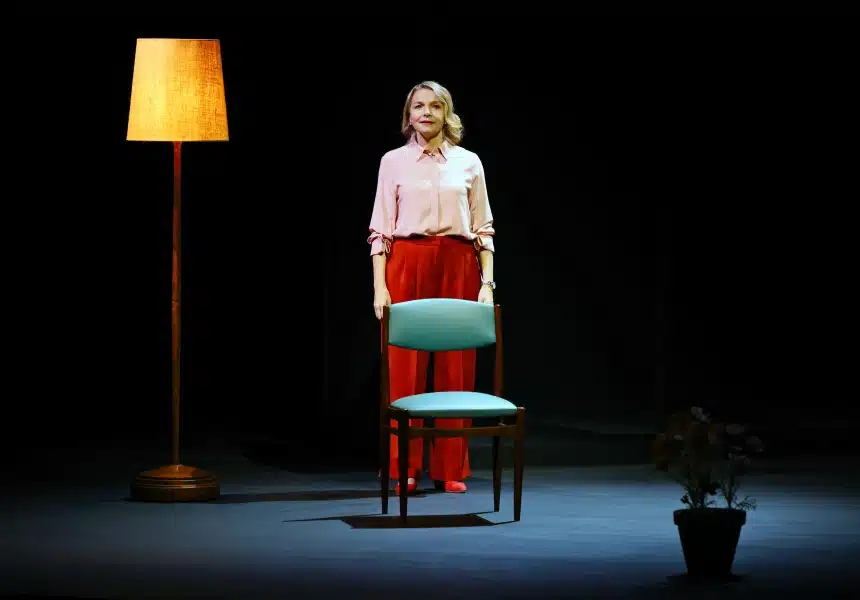
JULIA
16th of August – 31st of August, 2024
Dunstan Playhouse, Adelaide

